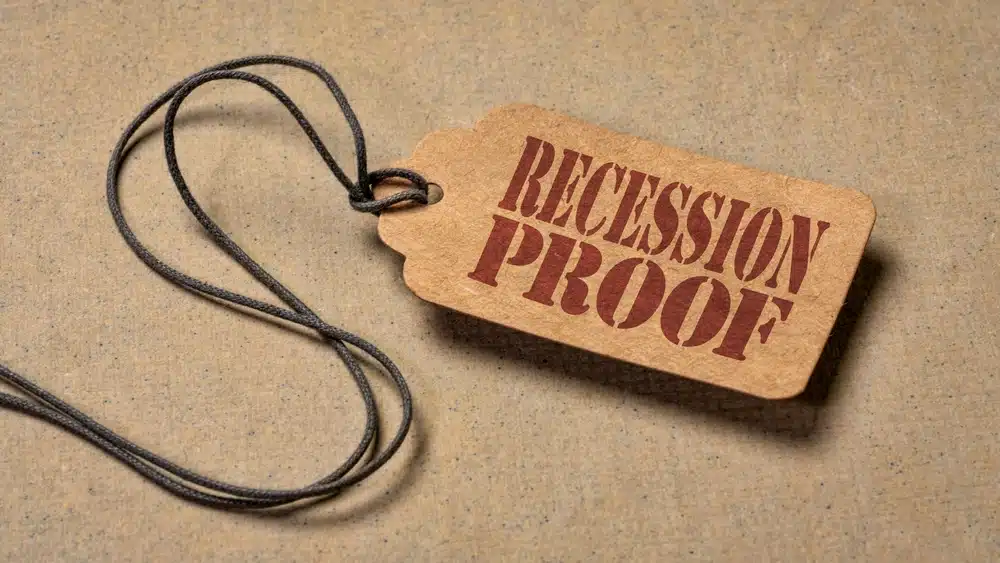 In today’s ever-changing economic landscape, having a recession-proof business can be a key factor for long-term success. While economic downturns can pose challenges to many businesses, some industries and business ideas have proven to be more resilient during tough times.
In today’s ever-changing economic landscape, having a recession-proof business can be a key factor for long-term success. While economic downturns can pose challenges to many businesses, some industries and business ideas have proven to be more resilient during tough times.
Recession-proof business ideas are those that continue to thrive even in times of economic uncertainty, providing products or services that are essential or in high demand regardless of the economic climate.
Entrepreneurship, however, isn’t necessarily the opposite of an economic downturn. A recession doesn’t mean there will be no opportunities for starting a business, on the contrary.
Our recession-proof business ideas have been carefully researched to give your inner entrepreneur hope. Last but not least, we’ll leave you with a few tips on how your business can protect itself from recessions.
In this article, we will explore some potential recession-proof business ideas that have the potential to withstand economic fluctuations and offer entrepreneurs opportunities for stability and success.
What do recessions mean for small businesses?
A recession is a period of reduced economic activity that is prolonged and pervasive. Consequently, less money is spent, and less goods are manufactured and traded.
How does this affect SMEs? The news is usually not good. During a recession, companies of all sizes usually experience a decrease in sales and profits. In an economic downturn, however, small businesses may be particularly vulnerable since they do not have the additional capital available to large enterprises for a prolonged period of loss.
Any business owner would shiver at the thought of layoffs, red numbers in their account books, or hiring freezes as the consequences.
A recent ONS report shows that SMEs in the UK have been feeling the pinch. We know the following:
- Global supply chain disruptions affected 16% of businesses with 10 or more employees in December 2022
- The majority of large businesses (28%) reported a shortage of workers in January 2023, while 40% reported that they were unable to meet demand.
- The number of company insolvencies in England and Wales reached a record high in 2022, the highest level since 2009.
What kind of business does well in a recession?
The price of an inelastic product is not affected by its price. In other words, consumers are likely to continue to demand these recession-proof products and services, no matter how bad the economy gets. Taking a closer look will help us understand why.
What even is Price Elasticity of Demand (PED)?
A good example of elasticity of demand is that it refers to whether the price of a good or service will not affect the demand for the product. What is the relevance of this to us? Despite the state of the economy, a consumer will continue to demand a good at consistent levels. Price elastic goods and services, on the other hand, disappear once they become more expensive. Entrepreneurs facing recessions should focus on finding business opportunities for goods and services that are inelastic to price.
Best recession-proof businesses ideas for 2026
To help you plan your next venture, here are some recession-proof ideas:
Groceries – food’s price inelasticity is no surprise. It goes without saying that everyone needs to eat, no matter how much money they have to spend. Even in recessionary times, grocery businesses will perform relatively well.
Baby products and childcare – despite cutting back on their own spending, most adults won’t cut back on their kids’. Baby products remain in high demand despite periods of negative economic fluctuations, including diapers and baby formula.
Healthcare – The healthcare industry can be considered defensive just like grocery shopping. People will still take care of their health no matter how the economy is doing. In an economic downturn, the healthcare industry is replete with viable business ventures, whether it’s pharmaceuticals or at-home medical services.
Education – Regardless of what happens to the economy, demand for education remains constant regardless of whether you’re catering to parents who want their children to do well in their A-Levels. If you are good at transferring your knowledge to others and have specialised knowledge in any area, this may be a good choice for you.
Repairs – Most people do not have the expertise to do repairs on their own, whether it is for their homes or cars. In other words, even in the midst of a recession, if there is a leak in your house or if your car’s engine makes strange noises, you will probably need to hire a repairman.
Beer, wine, and liquor – Although the country’s economy is beginning to deteriorate, the alcohol industry tends to do well. While this is not a healthy habit, for some people it’s a coping mechanism, so there is always a business opportunity to be had.
Confectionary– candy may seem price elastic at first glance. Sweets aren’t exactly necessary. In difficult economic times, many will likely turn to sugar as their comfort food, regardless of the economic climate. The 1920s Great Recession actually led Hershey’s sales to increase.
Pet products – During a recession, pet products follow the same logic as childcare products. This is a recession-proof business venture since dog owners will still need to buy dog food and pay for their vet bills, no matter how tight their budgets are.
Financial advice and accounting – this one is rather straightforward. Financial connoisseurs help people break even during recessions when they are struggling. Knowing how to navigate turbulent economic waters will make it easy for you to sell yourself to those who need your guidance.
Digital marketing – although at first glance this one might seem counterintuitive (fewer people buy things, less need for marketing), digital marketing agencies can easily adapt to difficult economic conditions due to their flexibility and scalability. Rather than dealing with stock, you only deal with your staff, making you immune to supply chain disruptions. You may also be able to assist companies in making members of their in-house marketing team and outsourcing to an agency.
Cleaning – Despite the Bank of England’s dire predictions, nobody wants to live in near-squalor conditions. Hygiene has become more important since the COVID-19 pandemic, resulting in more price inelasticity for domestic and professional cleaning services. Additionally, hybrid working has led to an increase in domestic cleaners. As a recession-proof business, it’s a solid choice.
Dropshipping – Ecommerce business can help you get out of a recession since there is no rent associated with it. The cost can, however, be further reduced. When you dropship, you don’t need to worry about storing the products you’re selling or pre-ordering them in advance. By charging a higher rate than the original retailer, you can make a profit by ordering from a wholesaler. Due to its low overhead costs, this is perfect for recessions.
Real-life recession-proof business examples
These start-ups are booming right now, despite historical examples like Hershey’s or Pure Gym thriving during recessions.
Caura
With Caura, you can manage all aspects of your car in one app. From paying your MOT to insuring your vehicle, all you have to do is go to one website instead of bouncing from one website to another. Lloyds Banking Group recently invested £4 million in this simple idea.
You can currently lower your insurance costs to zero by referring enough people to Caura.
Pasta Evangelists
Even during the current economic crisis, pasta evangelists are able to captivate consumers. During difficult economic times, deliveries and pasta kits may seem like a luxury. In this way, at-home dining reduces costs such as transport, childcare, and corkage, which are associated with dining out.
There are plenty of business opportunities for Pasta Evangelists despite the current economic downturn. Pasta Evangelists offers Italian takeaways directly from their local kitchens to pasta lovers across London.
Flower Station
We have been providing same-day flower delivery services for more than 20 years at Flower Station. With several shops open 24/7 in central London, it continues to be one of the UK’s destination flower delivery services, despite the Great Financial Crisis and the current downturn.
Tips for recession-proofing your existing business
To understand how recession-proof businesses escaped drowning by riding the recessionary wave, we interviewed real-life examples.
- Keep your costs as slim as possible. It’s not only important to keep your costs low during a recession, but it’s also important to stay calm when you get a lot of funding. However, Caura CEO Lakshmi told us that the team won’t be growing in a significant way despite its £4 million funding from Lloyds Banking Group.
- Focus on your core mission and stay true to it. While it’s good to focus on your core proposition when things aren’t going well, there’s always these other bells and whistles people want to add.
Read more: Great business ideas for entrepreneurs
Conclusion
The news can be terrifying for business owners these days. A time like this is not an easy one to be pursuing entrepreneurial dreams, whether inflation is on the rise or insolvency is on the rise. There is, however, no requirement that this is the case. Developing a business venture that is price inelastic that provides goods or services that all customers need (or reach for continuously) will lead you to business stability.
You shouldn’t assume that picking one of the business ideas suggested on this page will guarantee your success. In order to better position yourself within a specific industry, you should still be diligent with your costs.
Lee Jones is a seasoned Business Finance Specialist with over two decades of invaluable experience in the financial sector. With a keen eye for market trends and a passion for helping businesses thrive, Lee has become a trusted advisor to countless organizations seeking to navigate the complexities of finance.


